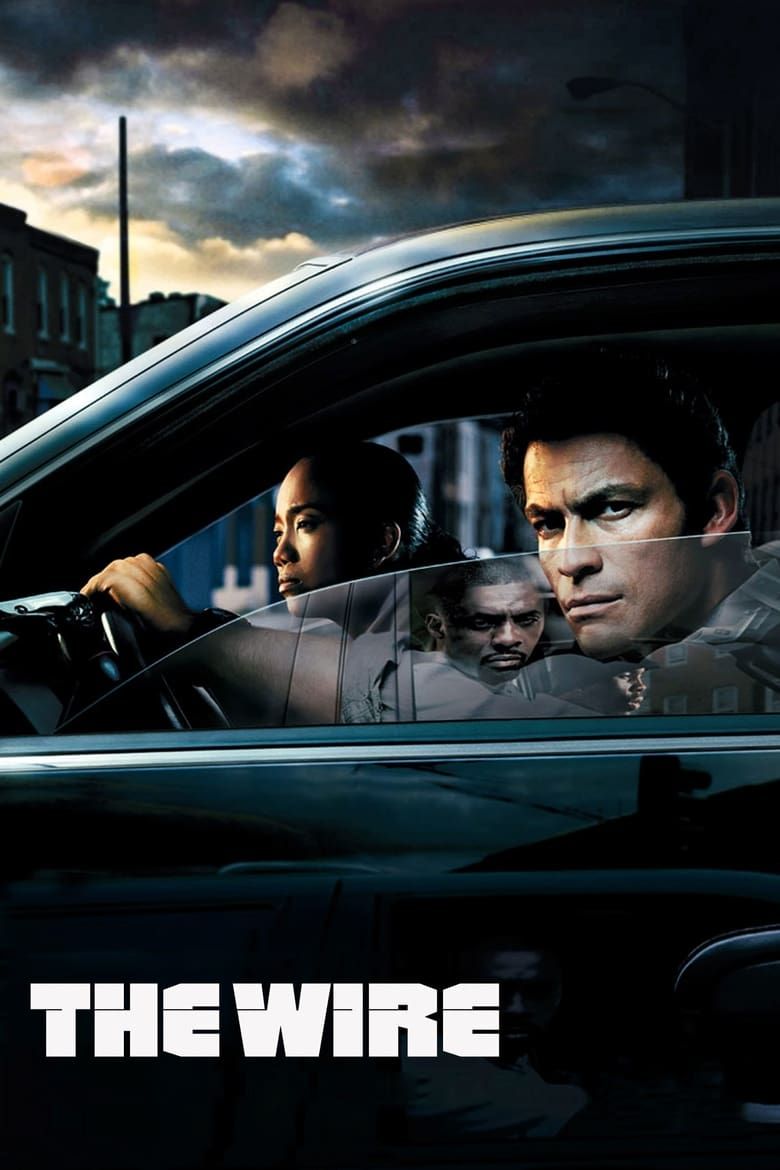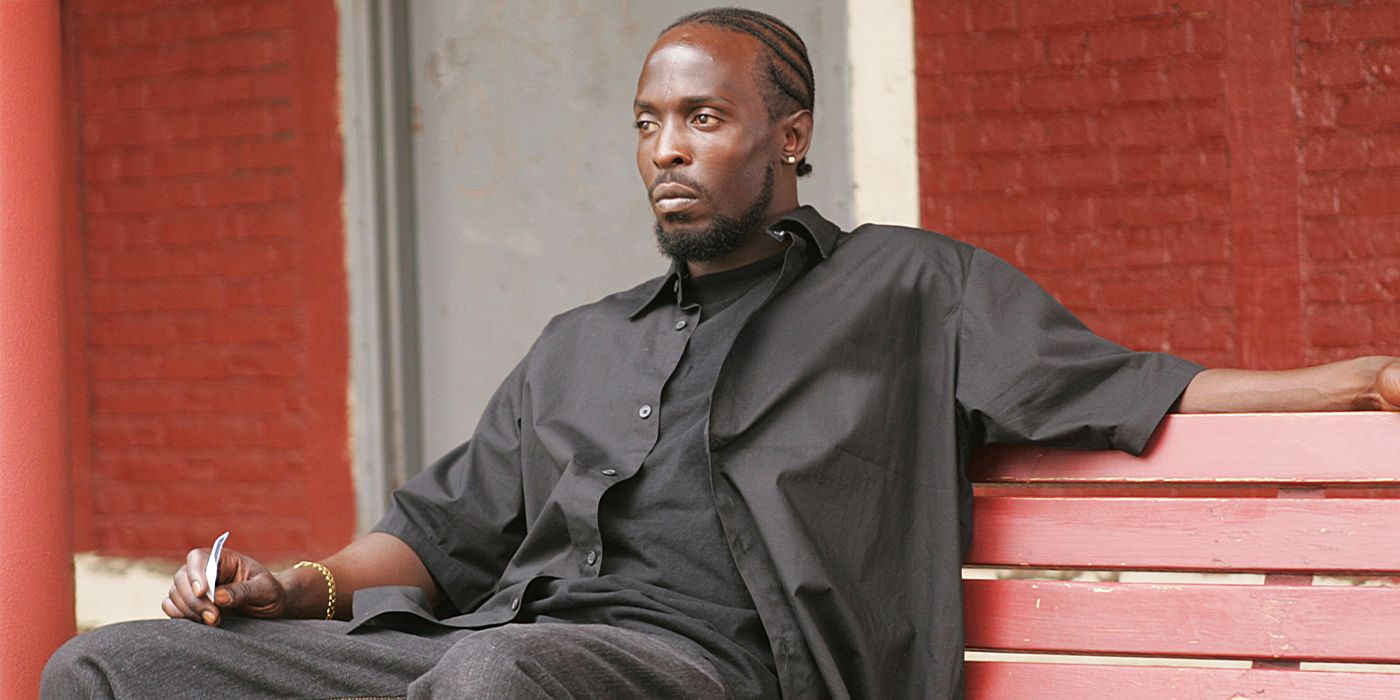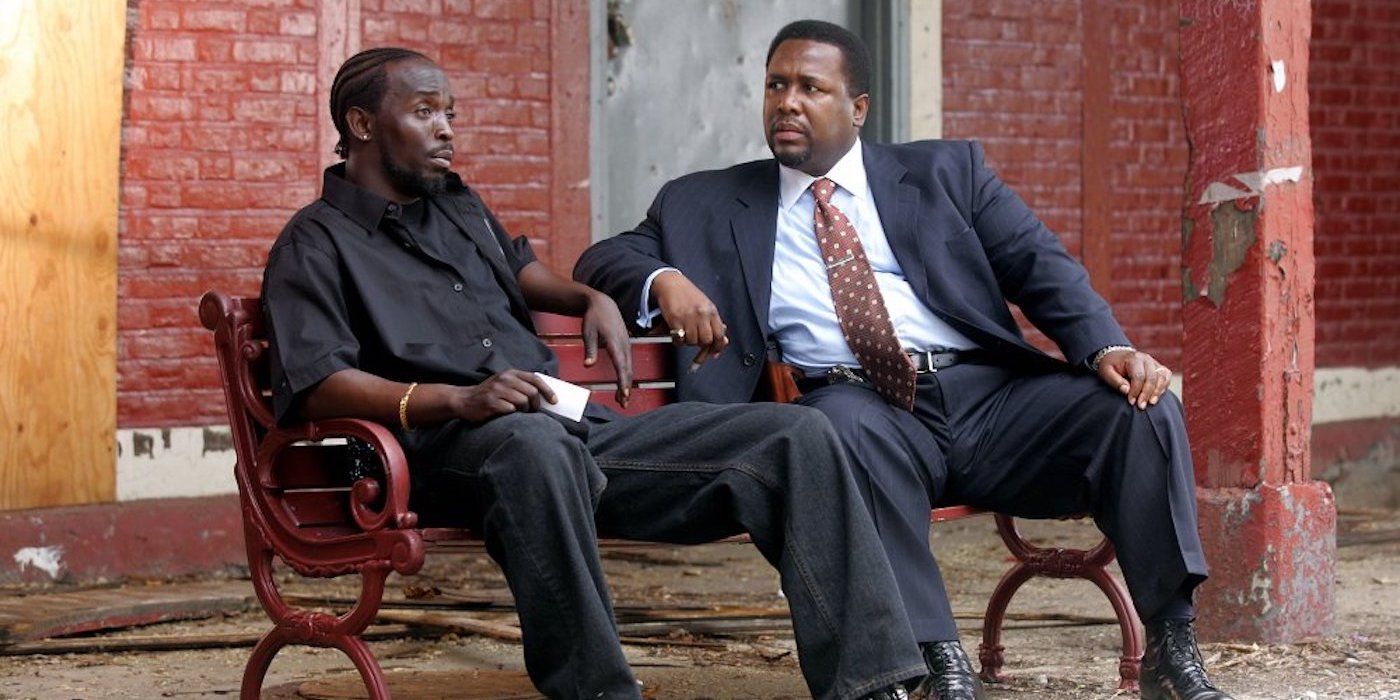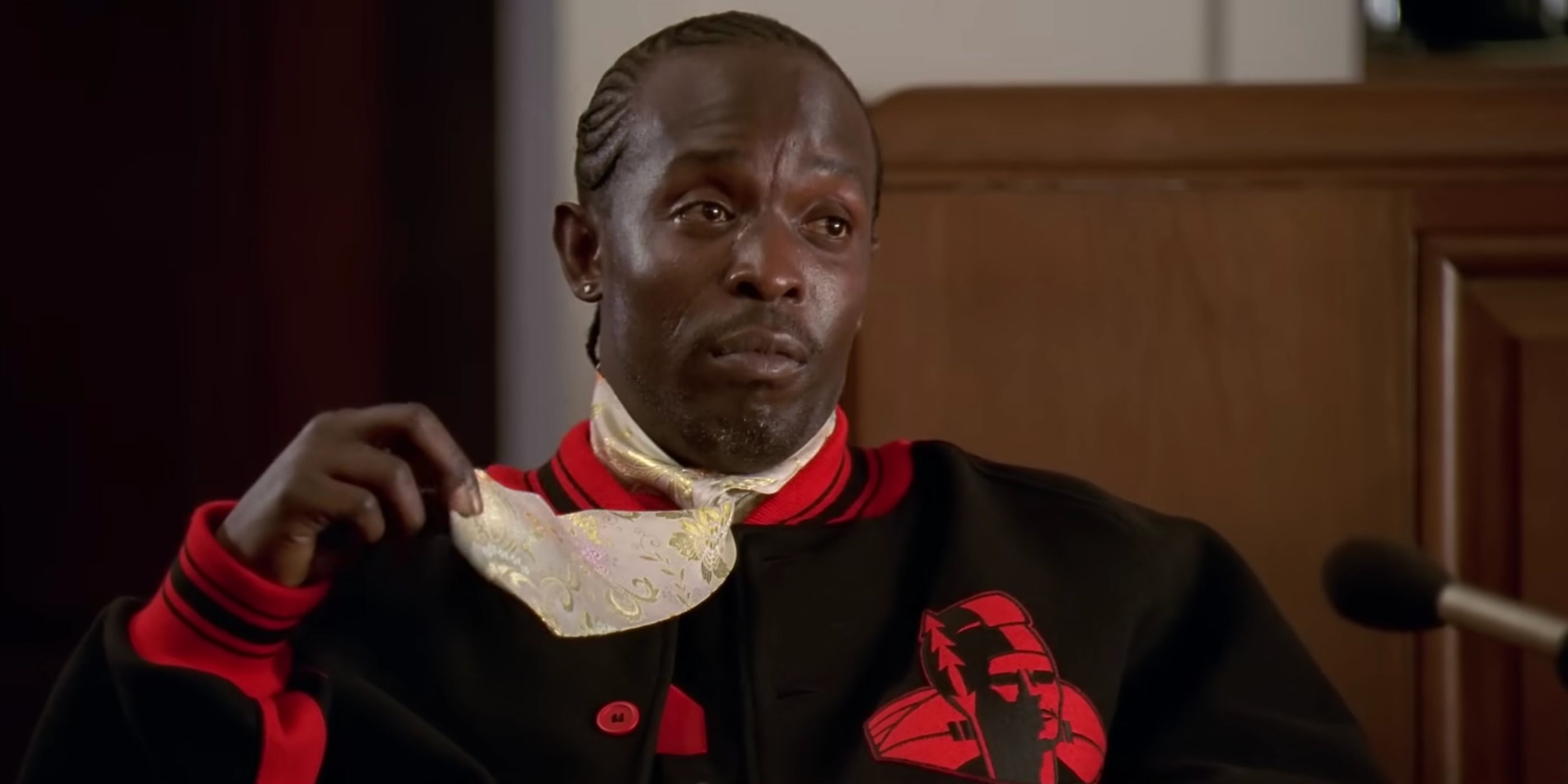The Wire, the gold standard for prestige television in the 2000s, is worthy of every superlative, but its dialogue writing stands out as being particularly great. The series is remembered for delivering thrilling sequences in between documentary-like studies of the streets and municipal offices of Baltimore, Maryland, such as Kima’s (Sonja Sohn) shooting while undercover in Season 1 or Stringer Bell’s (Idris Elba) demise in Season 3.
Time and time again, it was fan-favorite Omar Little (Michael K. Williams), the stick-up artist who embodied the thesis of David Simon‘s police drama, who provided some of the most iconic moments, including his shocking death. However, in the long run, his most pivotal scene that forever altered the fabric of The Wire was a stirring conversation between Omar and William “Bunk” Moreland (Wendell Pierce) in Season 3 about justice, the criminal code, and most of all, “how far we done fell,” as people, to quote the detective.
‘The Wire’s Dialogue Is Rich, Informative, and Wildly Entertaining
The Wire was a groundbreaking cop procedural for its incredible restraint, never resorting to embellished portraits of detective work and crime-solving usually seen on TV. Most of the police officers’ labor in the show revolves around sheer grunt work, sorting through files and staring at computer screens. Where most shows gloss over the shoe leather, the mundane specifics of a line of work, The Wire thrived as a chamber drama where characters discuss inner-office politics, legal matters, and monotonous surveillance.
Thanks to the creative liberties offered by HBO, viewers couldn’t find better dialogue anywhere other than the cable channel, with The Wire representing the pinnacle of television writing. The show’s dialogue had the pathos of dramatic theater and the pulpiness of crime novels, as the show featured writing contributions from novelists like Richard Price and Dennis Lehane. This amalgamation of sensibilities, which felt informed by ground-level insight into the drug trade and various city institutions, was the key to The Wire‘s excellence.
Bunk Confronts Omar About a Murder in This Pivotal Scene in ‘The Wire’
By Season 3, The Wire found its stride and never looked back. The series, which weaved in Baltimore’s mayoral and legislative offices from the perspective of the ambitious Tommy Carcetti (Aidan Gillen), began to feel like a grand statement on America in the 21st century. Speaking to the brilliance of The Wire, these lofty themes were distilled in one scene between Omar and Bunk. David Simon and his writers struck poetic gold whenever two members on opposite sides of the law sat down and discussed their codes and moral compasses. Think of Jimmy McNulty’s (Dominic West) sobering lunch meal with Bodie (J.D. Williams) or “Bunny” Colvin’s (Robert Wisdom) mentorship of the corner boys — these moments and arcs deconstruct the rigid stereotypes of cops and crooks on television and reflect the overwhelming disillusionment of the American people and their purposes.
In Season 3, Episode 6, “Homecoming,” Bunk confronts Omar, sitting on a bench, over the recent murder of one of his crew members, Tosha (Edwina Findley). The detective encountered this case after reaching a dead-end in his ongoing missing gun case lost by a fellow officer, but Omar refuses to cooperate, despite giving him the time of day. Baltimore’s own Robin Hood stares straight ahead as Bunk doesn’t try as much to get him to cooperate, but rather, just to show some remorse for the death of a supposed confidant. Omar coldly tells Bunk that her killing is the “cost of doing business.” The slick and sardonic Bunk is livid at Omar, shrugging off the moral implications of another casualty in “The Game,” and he stands up in rage as he explains how shallow he really sounds.
Only in The Wire could you see two characters on opposite sides of the law with starkly contrasting views of morality and justice engage in such an intimate conversation. We learn that Bunk and Omar attended the same high school and grew up in the same tough neighborhood, and the former reveals that he once aspired to be a hard-nosed gangster like the latter, but he found the righteous path before he could spiral into a life of crime. Today, his deep frustration with Omar’s life as a violent outlaw stems from the irreversible ripple effects his actions have on the community. “Now all we got is bodies,” Bunk proclaims, underlining the downfall of a once-promising Baltimore community that has fallen victim to endless crime enabled by “predatory” people like Omar.
“I saw kids acting like Omar — calling you by name, glorifying your ass — makes me sick, motherf—er, how far we done fell,” Bunk says, recounting his visit to the crime scene of Tosha’s murder. This rousing speech marks Wendell Pierce’s finest moment in the show. Watching the usually glib Bunk get so riled up about an issue that is personal and resonant to the future of Black people in America is jarring. Expressing few words, the late Michael K. Williams is equally powerful in this scene, with each of Bunk’s scathing remarks withering at his steeliness.
This Scene in Season 3 of ‘The Wire’ Reveals a Lot About America
You can read past his cold demeanor to see that he is upset by Tosha’s death, and he is actively reckoning with his culpability, evident by the fact that he has no witty comeback to Bunk’s rant. Those kids Bunk referred to aren’t the only ones to glorify Omar. The character fits the mold of other 2000s TV anti-heroes like Tony Soprano and Walter White, who were celebrated by audiences despite perpetually committing grave sins. In this exchange, Bunk demystifies Omar, chiding him for being another disgraceful symbol of the degradation of a community and race of people. While Omar can leave an imprint on his milieu, Bunk, operating in an institution indifferent to bringing justice, is powerless.
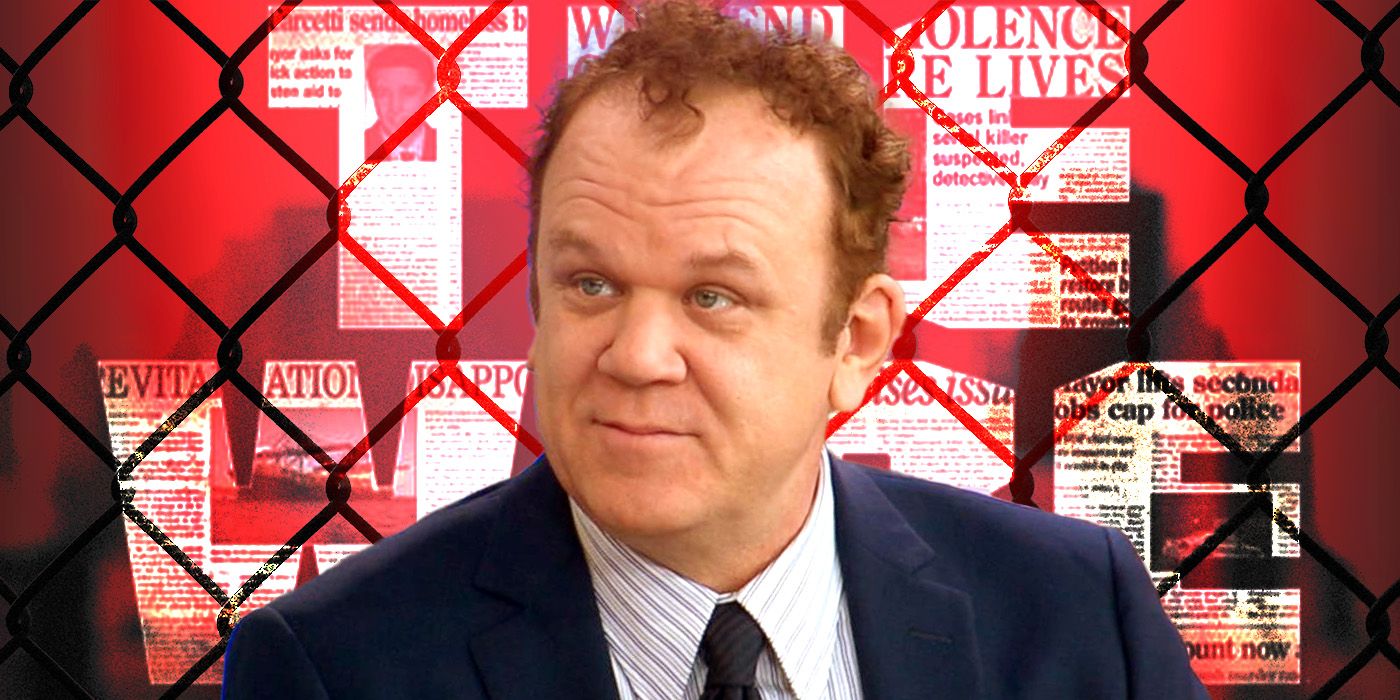
Related
‘The Wire’ Could’ve Looked Wildly Different With John C. Reilly in This Role
David Simon, that is certainly a choice.
This scene in The Wire episode “Homecoming” sneaks up on viewers, as, at the outset, it seems like a rudimentary scene where Bunk tries to pull any testimony out of Omar. As Bunk unwinds, this exchange is not about Tosha’s murder, but rather, the destruction of a community and the American Dream, or, in other words, the thesis of The Wire. The show argued that institutions are cyclical, and the ones that are broken — notably the police force — will never learn their lesson. There will continue to be more murders and more people aspiring to be Omar, as his autonomy is idyllic in the eyes of kids raised on the streets. In Baltimore, its denizens are interchangeable. In an alternate universe, Bunk, had he continued looking up to the “hard” folks in the neighborhood, would have been on the opposite end of the law, and Omar, had he taken a different path, certainly had the wit and ingeniousness for police work.
Bunk confronting Omar epitomizes the tragic undertones of The Wire. It registers tonally in Wendell Pierce’s delivery and resonates textually as a show about people operating by their own code in an increasingly failing system. After this earth-shattering scene, The Wire could be viewed as not a bout between good and evil or cops and criminals, but a meditation on morality and America.
